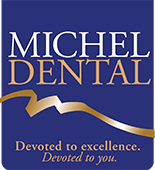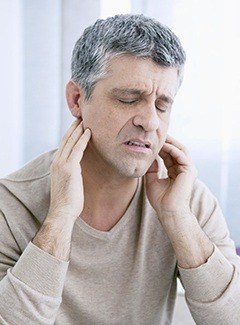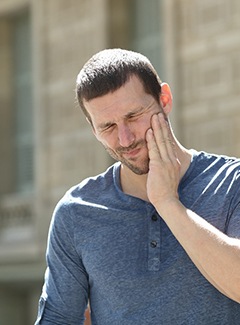
TMJ/TMD Treatment - Topeka & Silver Lake, KS
Relief From Chronic Jaw Pain is Possible
Headaches, earaches, and pain when opening your mouth are just a few of the symptoms of temporomandibular joint (TMJ) dysfunction, or TMD. Our dentists’ extensive training and experience in diagnosing and treating TMJ problems make them uniquely qualified to deliver relief and restore healthy function to your jaw. At Michel Dental, we offer non-surgical TMJ therapies to help you eat, speak, and be free from jaw pain -- keep reading to find out more!
Why Choose Michel Dental for TMJ/TMD Treatment?
- Treating TMJ Patients For 30+ Years
- Advanced Training in Jaw & Muscle Function
- Custom Oral Appliance Therapy For Long-Term Relief
Why Does TMD Occur?
Smooth, comfortable jaw motion depends on the optimal function of the two small joints that reside in front of your ears or the temporomandibular joints. But when stress, a misaligned bite, facial trauma, or other factors impact the TMJ, pain and pressure occur as a result.
Warning Signs of TMJ/TMD

People who have TMJ/TMD frequently deal with chronic pain or limited function of the jaw. You may experience a clicking, popping jaw, migraine headaches, ear or neck pain, tingling in the fingers and hands, and other symptoms that range in severity from mild to debilitating. Your partner may also observe you grinding your teeth at night.
Do not hesitate to seek treatment for TMJ/TMD. Left ignored, the related teeth grinding and jaw clenching can severely wear down the tooth enamel. Headaches, migraines, and other chronic pain issues will only worsen without proper treatment.
How Does a Dentist Treat TMJ/TMD?

When you come into Michel Dental for a TMJ consultation, we will evaluate your chewing system to pinpoint the source of your discomfort. Our office is equipped with the latest technology to determine optimal jaw alignment and assess whether or not jaw joint damage has occurred. Based on our findings, we will put together a plan suited just for your smile.
Many patients find relief from TMJ dysfunction with oral appliance therapy. Your dentist prescribes a comfortable, custom-fitted mouthguard for you to wear while you sleep. The mouthguard prevents jaw clenching and teeth grinding to ease strained jaw muscles. If misaligned teeth are causing your jaw pain, your dentist may recommend orthodontic treatment or adjustments to the tooth enamel to bring the bite into proper alignment.
Natural Solutions to Jaw Pain

In addition to seeking professional treatment for your jaw pain, you may want to try making some lifestyle changes to reduce the incidence of stress-related teeth grinding and jaw clenching that put pressure on the TMJ. Adopting vigorous exercise, visiting a talk therapist, or cutting back on alcohol and tobacco can all help. Making a conscious effort to unclench your jaw during the day can help to stop the habit at night, and applying a warm compress to the jaw joint right before bed can help to relax it and prevent unconscious teeth grinding.
Seek Therapy for Your Aching TMJ In Topeka

Your smile is unique, and we will customize a TMJ treatment plan specifically for your situation. When your TMJ joints work properly, you will feel better, look better, and experience the comfortable function you deserve! Contact either our Silver Lake or Topeka location today to schedule a consultation today.
TMJ FAQs

Are you confused about the nature of your TMD or how your treatment plan is supposed to work? Dr. Michel realizes that it’s normal for patients to have plenty of questions about their jaw pain. On this page, you can find the answers to some of the concerns that have been at the front of many a patient’s mind during their TMJ therapy. If there’s more you want to learn, you can contact us to schedule a consultation.
Is TMJ Treatment Safe?
Yes, TMJ treatment is safe when guided by an experienced dentist like Dr. Michel and Dr. Weber. At Michel Dental of Topeka, our team takes a conservative approach, beginning with non-invasive treatments like oral appliances. These mouthguard-like tools are custom-fitted to reduce strain on your jaw joints while you sleep.
This method is effective, comfortable, and completely reversible. As a trusted TMJ specialist in Topeka, we will carefully evaluate your symptoms and create a personalized plan that prioritizes safety and long-term relief.
With routine monitoring and adjustments, you can feel confident knowing your treatment is both effective and safe, so you can focus on living life without pain.
Does Insurance Cover TMD Treatment?
Coverage for TMD treatment can vary depending on your insurance provider and plan details. Some policies classify it as a dental issue, while others may consider it a medical condition. At our Topeka dental practice, our team will review your benefits and help you understand what’s included.
We’ll also work closely with patients to maximize coverage and reduce out-of-pocket costs. Even if your plan offers limited benefits, we provide flexible payment options like CareCredit and our Smile Savings Plan to make care affordable. If you’re unsure, bring your insurance information to your consultation, and we’ll guide you through the process.
Can TMD Be Fixed with Invisalign?
In some cases, yes. Invisalign can help correct the underlying bite issues that contribute to TMD. If misaligned teeth or an uneven bite is placing extra stress on your jaw, orthodontic treatment may provide long-term relief.
When you visit our office, we’ll evaluate whether Invisalign or oral appliance therapy is the best solution for your specific situation. We often recommend starting with a non-invasive appliance. However, if your bite alignment is a significant factor, Invisalign may help reposition your teeth and reduce jaw strain.
Our comprehensive approach makes us one of the most trusted TMJ treatment providers in Topeka and ensures you receive effective treatment for lasting comfort.
Can a TMD Be Ignored?
Some patients think they can live with their TMD at first. However, even if the symptoms seem manageable, they will only grow worse over time. The condition typically occurs if the joint connecting the jaw to the head is damaged, and it will only continue to deteriorate over time if nothing changes. Consequently, your pain will become more severe, and speaking and chewing could become more difficult. After a certain point, your inability to freely move your jaw and your constant state of discomfort can become debilitating, and more complex treatments will be required. It’s always better to call Michel Dental as soon as you suspect you might have a TMD.
How Will I Know If My Headache is Caused by a TMD?
There are many cases where people think they are suffering from migraines when in fact they have a TMD that is causing their headaches. In general, when a headache is linked to a problem with your jaw, the pain will be dull and aching; it can occur on one or both sides of the head, and it gets worse whenever you move your jaw. Migraines, on the other hand, are often throbbing and sharp, and they might even affect your vision in some cases. Differentiating a TMD headache from a migraine could be the key to getting effective treatment, so call us to ask about having your condition diagnosed as soon as possible.
Can Changing My Diet Help My TMJ Pain?
You may be asked to make a number of changes to your daily routine during your TMJ therapy; some of these changes may involve your diet as well as the way you eat. It’s generally recommended that you stick to soft, easy-to-chew foods (such as yogurt, pasta, and mashed potatoes) while avoiding hard foods that would strain your jaw joints (such as apples, carrots, and corn on the cob). Tough foods such as meat can still be okay if you grind or chop them up first. While you won’t have to adhere to such a diet forever, these precautions are generally recommended for times when your symptoms are particularly bothersome.
How Long Will I Need to Wear My Oral Appliance?
There’s not always an exact timeline for how long you’ll need to wear your oral appliance. You may notice that your symptoms have been reduced somewhat right away, but they’ll still be present to some degree. There have been studies showing that many patients see significant improvements after six weeks; however, full relief from your symptoms may take a matter of months. Of course, these are very general estimates, and we can give you a better idea of what kind of timeline to expect after you’ve received your appliance.
I Need a Checkup & Cleaning I Have a Cavity or Broken Tooth I am Missing One or More Teeth I Have a Dental Emergency I want to Improve My Smile I am Worried About Gum Disease I am Anxious or Scared of the Dentist I Want a Straighter Smile I am Concerned About Sleep Apnea View Our Services